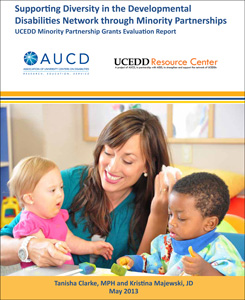To promote diversity within the Developmental Disabilities Network, as well as address health disparities experienced by minority populations, the Administration on Intellectual and Developmental Disabilities (AIDD) in 2009 awarded three-year partnership grants to two UCEDDs - the Center for Leadership in Disability (CLD) at Georgia State University, and the University of Southern California UCEDD (USC UCEDD) at the Children's Hospital of Los Angeles.
To promote diversity within the Developmental Disabilities Network, as well as address health disparities experienced by minority populations, the Administration on Intellectual and Developmental Disabilities (AIDD) in 2009 awarded three-year partnership grants to two UCEDDs - the Center for Leadership in Disability (CLD) at Georgia State University, and the University of Southern California UCEDD (USC UCEDD) at the Children's Hospital of Los Angeles.
This report was developed to guide University Centers for Excellence in Developmental Disabilities (UCEDDs) and Minority Serving Institutions (MSIs) by revealing strategies, highlighting accomplishments and outcomes of the projects, and identifying lessons learned by grantees as well as providing recommendations for UCEDDs, AIDD, and AUCD. The expectation is that by informing the network, leadership from all Centers will seek out similar opportunities to create academic and clinical programs for diverse students and the individuals they will go on to serve.
rv_web300w.jpg) Through this grant, the partnerships have established a positive presence in the respective institutions, created new initiatives, and established new programs that have positively affected the participation of minority populations in disability and healthcare fields. The minority partnerships offered an opportunity to bring people from diverse populations into the disability field as collaborators and colleagues, which offers the potential for them to eventually enter the leadership ranks. UCEDD trainees who benefited from the UCEDDs exposure and additional professional development that resulted from the Minority Partnership grants may also pursue leadership roles. In addition, the partnerships allowed for the UCEDDs to expand the academic content of students and exposed many to career fields they were never aware of. These outcomes could potentially increase the numbers of racially, ethnically, and linguistically diverse professionals seeking a graduate career in fields that address the needs of the DD population.
Through this grant, the partnerships have established a positive presence in the respective institutions, created new initiatives, and established new programs that have positively affected the participation of minority populations in disability and healthcare fields. The minority partnerships offered an opportunity to bring people from diverse populations into the disability field as collaborators and colleagues, which offers the potential for them to eventually enter the leadership ranks. UCEDD trainees who benefited from the UCEDDs exposure and additional professional development that resulted from the Minority Partnership grants may also pursue leadership roles. In addition, the partnerships allowed for the UCEDDs to expand the academic content of students and exposed many to career fields they were never aware of. These outcomes could potentially increase the numbers of racially, ethnically, and linguistically diverse professionals seeking a graduate career in fields that address the needs of the DD population.
The multitude of accomplishments by the minority partnerships, although not without their challenges, has proven the positive impact such programs have on diversity in the field of developmental disabilities and healthcare now and in the future. However, in order for the program to continue to impact the diversity of the field of developmental disabilities and eventually have a role in reducing health disparities in minority populations, the minority partnerships need to continue down the path of sustainability and be replicated in other universities and states. A significant number of lessons and recommendations are shared as a resource to the UCEDD network for such replication efforts.




rv_web300w.jpg) Through this grant, the partnerships have established a positive presence in the respective institutions, created new initiatives, and established new programs that have positively affected the participation of minority populations in disability and healthcare fields. The minority partnerships offered an opportunity to bring people from diverse populations into the disability field as collaborators and colleagues, which offers the potential for them to eventually enter the leadership ranks. UCEDD trainees who benefited from the UCEDDs exposure and additional professional development that resulted from the Minority Partnership grants may also pursue leadership roles. In addition, the partnerships allowed for the UCEDDs to expand the academic content of students and exposed many to career fields they were never aware of. These outcomes could potentially increase the numbers of racially, ethnically, and linguistically diverse professionals seeking a graduate career in fields that address the needs of the DD population.
Through this grant, the partnerships have established a positive presence in the respective institutions, created new initiatives, and established new programs that have positively affected the participation of minority populations in disability and healthcare fields. The minority partnerships offered an opportunity to bring people from diverse populations into the disability field as collaborators and colleagues, which offers the potential for them to eventually enter the leadership ranks. UCEDD trainees who benefited from the UCEDDs exposure and additional professional development that resulted from the Minority Partnership grants may also pursue leadership roles. In addition, the partnerships allowed for the UCEDDs to expand the academic content of students and exposed many to career fields they were never aware of. These outcomes could potentially increase the numbers of racially, ethnically, and linguistically diverse professionals seeking a graduate career in fields that address the needs of the DD population.






